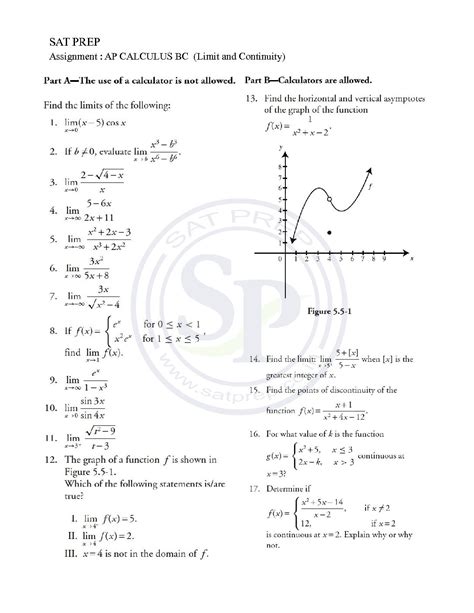Introduction
Limits are one of the cornerstones of calculus and form the foundation for understanding many advanced topics. The AP Calculus exam places significant emphasis on testing students’ understanding of limits, making it essential for students to master this concept. This guide provides a comprehensive overview of the limits test, a fundamental technique used to determine the existence and value of limits.

What is the Limits Test?
The limits test, also known as the definition of a limit, is a method for finding the limit of a function at a specific point or infinity. It is based on the notion of epsilon-delta definitions, which define a limit in terms of the closeness of the function’s values to a limiting value.
Step-by-Step Approach
To apply the limits test, follow these steps:
1. Define the limit expression: State the limit you want to evaluate, such as lim_(x->a) f(x).
2. Choose an epsilon (ε): Select a positive number that represents the desired tolerance for the function’s values.
3. Solve for delta (δ): Find the value of δ that ensures the magnitude of |f(x) – L| is less than ε for all x such that 0 < |x-a| < δ.
4. Prove the inequality: Demonstrate that |f(x) – L| < ε holds true for all x satisfying the condition 0 < |x-a| < δ.
5. Conclude the limit: If you can successfully prove the inequality, then the limit of f(x) as x approaches a is equal to L.
Types of Limits Test
There are two main types of limits test:
- One-sided limits test: Used to determine the limit of a function as x approaches a from either the left or right side.
- Two-sided limits test: Used to determine the limit of a function as x approaches a from both the left and right sides.
Some useful tables
- Table 1: Types of Limits
| Type of Limit | Expression |
|---|---|
| Infinite Limit | lim_(x->a) f(x) = ∞ |
| One-sided Limit | lim_(x->a+) f(x) or lim_(x->a-) f(x) |
| Two-sided Limit | lim_(x->a) f(x) |
| Does Not Exist | lim_(x->a) f(x) does not exist |
| Limit at Infinity | lim_(x->∞) f(x) |
- Table 2: Properties of Limits
| Property | Expression |
|---|---|
| Sum of Limits | lim_(x->a) (f(x) + g(x)) = lim_(x->a) f(x) + lim_(x->a) g(x) |
| Difference of Limits | lim_(x->a) (f(x) – g(x)) = lim_(x->a) f(x) – lim_(x->a) g(x) |
| Product of Limits | lim_(x->a) (f(x) * g(x)) = lim_(x->a) f(x) * lim_(x->a) g(x) |
| Quotient of Limits | lim_(x->a) (f(x) / g(x)) = lim_(x->a) f(x) / lim_(x->a) g(x) |
- Table 3: Limits of Trigonometric Functions
| Function | Limit |
|---|---|
| sin(x) | lim_(x->0) sin(x) = 0 |
| cos(x) | lim_(x->0) cos(x) = 1 |
| tan(x) | lim_(x->0) tan(x) does not exist |
- Table 4: Limits of Exponential and Logarithmic Functions
| Function | Limit |
|---|---|
| e^x | lim_(x->∞) e^x = ∞ |
| ln(x) | lim_(x->0+) ln(x) = -∞ |
Why Limits Test Matters
Limits test is crucial for the following reasons:
- Foundation for Calculus: Limits form the cornerstone of understanding derivatives, integrals, and other advanced calculus concepts.
- Understanding Continuity: Limits test helps determine whether a function is continuous at a given point, which is essential for studying functions and graphs.
- Solving Calculus Problems: Limits test is used to solve various calculus problems, including finding derivatives, integrating functions, and analyzing functions near singularities.
Benefits of Using Limits Test
Using limits test offers several benefits, such as:
- Precise Limit Determination: Limits test provides a rigorous and precise method for determining the exact value of limits.
- Proof of Continuity: It enables rigorous proofs of continuity, which is essential in calculus and analysis.
- Understanding Function Behavior: Limits test assists in understanding how functions behave near specific points or infinity.
Conclusion
The limits test is a fundamental technique in AP Calculus that empowers students to determine the existence and value of limits. By mastering this concept, students gain a solid foundation for comprehending calculus and solving various calculus problems. This guide has provided a comprehensive overview of the limits test, its types, properties, and importance, equipping students with the necessary knowledge and skills to excel in AP Calculus.
